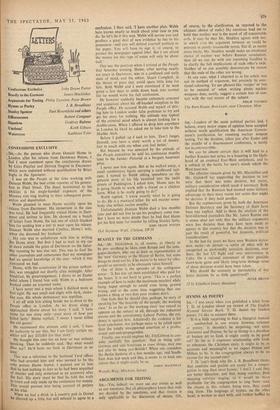SIR,—Leaders of the main political parties and, I believe, every
major organ of opinion have accepted without much qualification the American Govern- ment's justification for resuming nuclear weapon testing. Yet the decision, taken just after Easter and the middle of a disarmament conference, is surely not incontrovertible.
We can be almost certain that it will lead to a further Russian test series, to a lessening in the likeli- hood of an eventual East-West settlement, and to a setback in the battle for men's minds which the West must win.
The effective reasons given by Mr. Macmillan and Mr. Gaitskell for supporting the decision to test were that there was some decisive, but secret, military consideration which made it necessary. Both implied that the Russians had secured some military advantage in their most recent test series that might be decisive if they held another.
But the explanations given by both the American Defence Secretary and the Secretary of State have been less explicit. Add to them the analysis of the best-informed journalists like Mr. James Reston and it seems clear not only that the military arguments were less decisive than they have been made to appear in this country but that the decision was in part the result of powerful, but domestic, political considerations.
In the last six years we have seen Western states- men make—or permit—a series of what will be recognised as profoundly mistaken decisions, over Suez, the last U2 flight and over intervention in Cuba. On a rational assessment of their possible short-term gains and likely long-term damage none of these decision would have been taken.
Why should the necessity or inevitability of this latest decision be so little questioned?






































 Previous page
Previous page